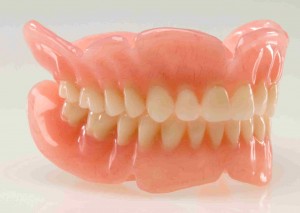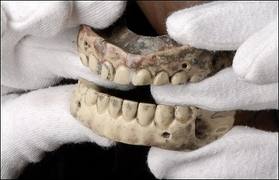In an ideal world we wouldn’t get cavities, have gum problems, or ever lose a tooth. Perhaps, the world might not be ideal, even then, but at least we wouldn’t have those problems.
Unfortunately, it is a fact of life that many people do lose their teeth – either to tooth decay or periodontal disease – and then require tooth replacements. Despite the growing popularity and acceptance of dental implants as prosthetic tooth substitutes, removable dentures still constitute the most common solution to missing teeth.
If a person still has some natural teeth, they may get what we term a “removable partial denture.” If they have lost all of their teeth, typically they will get a full denture. A commonly observed problem, however, is that once the dentures are made, patients tend to wear them far beyond the point where the denture continues to function well. A little background regarding the problem with dentures may help clarify why this is so:
Some people think that if they get rid of all of their teeth and get dentures they will finally see an end to their dental problems. This is far from reality. Actually, what happens is that patients simply trade one set of dental problems for another. While many patients will tell you that they eat just fine with their dentures, it has probably been so long since they had their real teeth, they have forgotten what it is like to eat normally.
What are some of the disadvantages of wearing dentures?
- You lose up to 50% of your biting force.
- A full upper denture covers your palate and interferes with your ability to taste your food.
- Dentures can move when you eat, speak, cough, or sneeze.
- Food accumulates around your dentures after a meal.
- Sore spots can develop when the hard denture rubs against your gums.
- Patients with an active gag reflex may not be able to even wear a denture without feeling as though they will gag.
- Multiple relines of the denture may be required as the shape of your mouth changes. This can happen as a result of gaining or losing weight, or as a result of bone shrinkage and aging.
- Atrophy of the upper or lower jaws can make it impossible to develop suction with the denture.
How long do they last?
This is an interesting question, because it is not unusual to encounter patients who tell you their denture was made twenty or even thirty years ago. Believe me, at that point, they are seldom good-looking dentures! But it underscores something about denture wear that is not well understood.
Once a denture is made and, assuming it fits well at the time of delivery, most patients expect – and can experience – good retention and stability.
But the key point is – once made – the dentures don’t change. Yet your mouth can – and often does. New medications can also cause your mouth to become dry, leading to irritation and sore spots. Osteoporosis could lead to shrinkage of the jaw. Despite these changes, many patients attempt to make up for new problems with denture adhesives. Unfortunately, this can open the door to even more irritation, and denture creams containing zinc have even been linked to other health problems such as numbness, tingling and muscle weakness.
While relines can assist with these changes and correct the fit of your denture to improve retention, many patients would do well to consider re-making their dentures after about five years to seven years. In my experience, waiting too long beyond that time period can make the transition to a new denture more difficult.
When the change is minimal, such as one might expect after about five years, the transition is generally quite easy. It also helps to have a spare denture for those “oops!” moments. Over the years, I have experienced patients dropping dentures into the sink while cleaning them, accidentally dropping them into garbage disposals, having dogs and cats chew them, and more. Patients will bite into hard objects and break a tooth, they take them out at night and sometimes sit on them, they get stepped on – and one, believe it or not, was even stolen! That was simply too strange a story to recount here.
If your denture is over five years old, talk to your dentist about whether it is time to reline or remake your denture. You will be glad you did.



